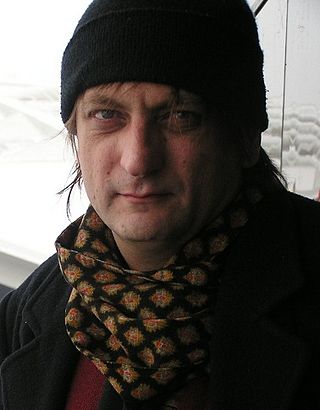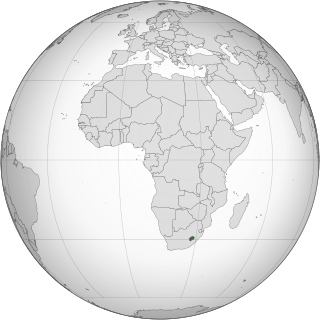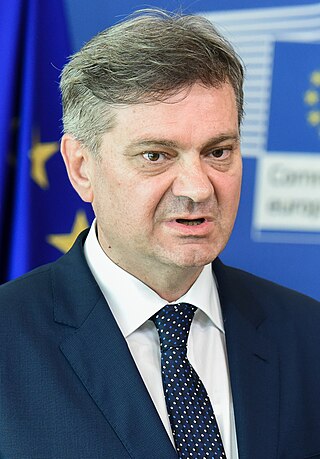Related Research Articles

Bosnian, sometimes referred to as Bosniak language, is the standardized variety of the Serbo-Croatian pluricentric language mainly used by ethnic Bosniaks. Bosnian is one of three such varieties considered official languages of Bosnia and Herzegovina, along with Croatian and Serbian. It is also an officially recognized minority language in Croatia, Serbia, Montenegro, North Macedonia and Kosovo.

The ten cantons of the Federation of Bosnia and Herzegovina, one of the two political entities of Bosnia and Herzegovina, are its federal units with a high level of autonomy. The cantons were established by the Law on Federal Units (Cantons) on 12 June 1996 as a result of the Washington Agreement of 1994 between the representatives of the Bosnian Croats and Bosniaks.

Lesbian, gay, bisexual, and transgender (LGBT) people in Bosnia and Herzegovina may face legal challenges not experienced by non-LGBT residents. Both male and female forms of same-sex sexual activity are legal in Bosnia and Herzegovina. However, households headed by same-sex couples are not eligible for the same legal protections available to opposite-sex couples.

Lesbian, gay, bisexual, and transgender (LGBT) people in Albania face legal challenges not experienced by non-LGBT residents, although LGBT people are protected under comprehensive anti-discrimination legislation. Both male and female same-gender sexual activities have been legal in Albania since 1995, but households headed by same-sex couples are not eligible for the same legal protections available to opposite-gender couples, with same-sex unions not being recognized in the country in any form.

Lesbian, gay, bisexual, and transgender (LGBT) people in Armenia face legal and social challenges not experienced by non-LGBT residents, due in part to the lack of laws prohibiting discrimination on the grounds of sexual orientation and gender identity and in part to prevailing negative attitudes about LGBT persons throughout society.

Lesbian, gay, bisexual, and transgender (LGBT) people in Azerbaijan face significant challenges not experienced by non-LGBTQ residents. Same-sex sexual activity has been legal in Azerbaijan since 1 September 2000. Nonetheless, discrimination on the basis of sexual orientation and gender identity are not banned in the country and same-sex marriage is not recognized.

Lesbian, gay, bisexual, and transgender (LGBT) people in Cape Verde are afforded some legal protections, and Cape Verde is considered a gay tolerant country. Homosexual activity has been legal in Cape Verde since 2004. Additionally, since 2008, employment discrimination on the basis of sexual orientation has been banned, making Cape Verde one of the few African countries to have such protections for LGBTQ people.
Elections for the Diet of Bosnia and Herzegovina were held from 18 May to 28 May 1910. This was the only Bosnian-Herzegovinian election held during Austro-Hungarian rule. 72 Members of parliament (MPs) were elected. There were three major political parties, though two other smaller political parties were elected also. The first vote consisted of landowners, college-educated citizens, priests, active and retired civil servants, and others. The second vote consisted of the population belonging to that of the city, which were artisans, merchants, petty bourgeoisie, etc.. The third and final vote consisted of the rural population. The first vote elected 18 seats of parliament, voted in by 6,866 voters. The second vote elected 20 seats of parliament, voted in by 4,725 voters. And the third vote elected 34 seats of parliament, voted in by 347,573 voters. The number of MPs were determined by religious percentage. Thus, the most populous religion at the time in the area, Eastern Orthodox Christianity, had 31 MPs elected. The next largest was Islam, where 24 MPs had been elected. The other religions elected were Catholicism, and Judaism.

Sasha Skenderija is a Bosnian-American poet currently residing in Prague.

Lesbian, gay, bisexual, and transgender (LGBT) people in Lesotho face legal challenges not experienced by non-LGBTQ residents. Lesotho does not recognise same-sex marriages or civil unions, nor does it ban discrimination on the basis of sexual orientation or gender identity.
Homosexuality in Serbia was first criminalised from 1860 through various regimes, until its first decriminalization in the Socialist Autonomous Province of Vojvodina in 1977. When Vojvodina was reintroduced fully into the Republic of Serbia legal system during the breakout of Yugoslavia, it was recriminalised again, until 1994, when it was decriminalised in the entire Serbia.

Homosexuality in Yugoslavia was first decriminalized in the Socialist Republics of Croatia, Slovenia, Montenegro and the Socialist Autonomous Province of Vojvodina in 1977. In other regions anti-LGBT legislation was, to varying degrees, progressively not implemented. The capital city of Belgrade, together with Zagreb and Ljubljana, became some of the first spots of an organized LGBT movement in the Balkans.

Denis Zvizdić is a Bosnian politician who served as Chairman of the Council of Ministers of Bosnia and Herzegovina from 2015 to 2019. He has been serving as member of the national House of Representatives since 2019. He also served as Premier of Sarajevo Canton from 2003 to 2006.

Lepa Mladjenovic is a feminist, lesbian, anti-war activist who is a pioneer of second-wave feminism in Serbia. She is a feminist counselor for women survivors of male violence or lesbophobia, a workshop facilitator, a writer and lecturer and a member of several international boards and networks which are concerned about lesbian rights and violence against women. Mladjenovic is considered a symbol of women's activism in the former Yugoslavia. Born in Belgrade, she spent her childhood summer holidays in Sarajevo and at the Adriatic Sea. As of 2017, Mladjenovic lives in Belgrade.
Alma Selimovic is a queer artist and LGBTIQA human rights defender. She was one of the organizers of the first Queer Sarajevo Festival and is known for her mixed media art works which explore questions of body, gender and sexuality. Selimovic has exhibited her work in over 30 museums, galleries and other venues in Bosnia and Herzegovina, Germany and the United States. As of 2017, she lives and works in the US. Selimovic identifies as a lesbian and gender-queer person.
Svetlana Đurković, also spelled Svetlana Durkovic, is a Bosnian-American feminist, anthropologist and LGBTIQ human rights activist known as a co-founder of Organization Q, the first LGBTQIA organization in Bosnia and Herzegovina. She has worked to eradicate discrimination based on sexual orientation and gender identity in Bosnia and Herzegovina. As of 2018, she lives and works in Maryland, and Washington, D.C.
Queer Sarajevo Festival was the first public queer festival in Bosnia and Herzegovina, organized by Organization Q in September 2008 in Sarajevo. The Festival is remembered as the first public coming out of LGBT*IQA persons in BiH. It became the center of interest of Bosnian-Herzegovinian, regional and international public and media after the escalation of violence against Festival participants and journalists on the day of the opening. The Festival was closed for the public two days after its opening, due to counter-reactions of general public, political representatives and as the organizers, journalists and Festival participants had been physically attacked by Islamic religious extremists and nationalists.
The human rights record of Bosnia and Herzegovina has been criticised over a number of years by intergovernmental organisations including the United Nations Human Rights Council, the European Court of Human Rights and the Organisation for Security and Co-operation in Europe, as well as international and domestic non-governmental organisations such as Human Rights Watch and Amnesty International. The government of Bosnia and Herzegovina has been criticised for ethnic and religious discrimination in its treatment of ethnic and religious minorities such as the Romani people and the Jewish people. The government has also been criticised for its treatment of Internally Displaced Persons following the Bosnian War and its failure to provide asylum seekers with resources such as food, shelter and medical assistance. According to BH Novinari, the Bosnian Journalists’ Association, freedom of the media is an issue in Bosnia and Herzegovina, with journalists facing attacks, threats and pressure from government. Human rights non-government organisations have also reported interference in their work from the government. The Bosnian government has been criticised by the European Union for its slow response to domestically prosecute war crimes from the Bosnian War following the closure of the International Criminal Tribunal for the Former Yugoslavia in December 2017.
Vera Kurtić is a Romani feminist activist and writer from Serbia, She is the author of the book Džuvljarke: Roma Lesbian Existence, which is the first book to discuss non-heteronormative Roma women's sexuality.
References
- ↑ Agan Uzunović (2016-05-18). "Bosnian LGBTI Activists Demand: Equality Now!". Revolution News. Archived from the original on 2016-06-03. Retrieved 2016-05-25.
- ↑ "About us – Sarajevski Otvoreni Centar". Soc.ba. 21 June 2013. Retrieved 2016-05-25.
- ↑ "Povećan broj slučajeva kršenja ljudskih prava LGBTI osoba - BUKA Magazin". 6yka.com. 2016-05-19. Retrieved 2016-05-25.
- ↑ "Norwegian Embassy supports Sarajevo Open Centre's Pink Report". Norveska.ba. 2016-05-17. Retrieved 2016-05-25.
- 1 2 3 4 "Pink Report 2023 – Annual Report on the State of Human Rights of LGBTI People in Bosnia and Herzegovina". Sarajevski Otvoreni Centar. 2023-06-08. Retrieved 2023-12-05.
- ↑ Becirovic, Adrijana (2017). "National Human Rights Institutions and the Protection of LGBTI rights in the Western Balkans- Experiences, Challenges and Good Practices" (PDF). Human Rights Papers (28). Sarajevski otvoreni centar: 68. ISSN 2303-6079.